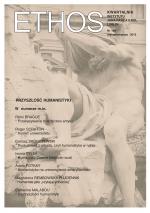 zobacz powiększenie | DOI 10.12887/28-2015-1-109-21 Tomasz PECIAKOWSKI – Autonomy, Critique and the Humanities: On the First and the Last Intellectuals Cena brutto: 7,00 PLN za szt. |
|
The intellectuals and the intelligentsia are the two social groups that complement each other creating a system of the elites and their audience. If the term ‘intellectual’ were to be applied not to all those who earn their living by intellectual activity, but only to the group of them who have decided to leave their ‘laboratories, studies, or libraries’ in order to participate in public life, the conclusion might be made that one becomes an intellectual through engagement. Bourdieu describes this paradoxical situation of individuals of high intellect by claiming that the intellectual cannot be conceptualized as long as he or she is considered in the context of the forced alternative between autonomy and engagement, pure culture and politics. According to Bourdieu, this dichotomy is faulty because intellectuals, despite their genealogical rootedness in it, also overcome it. The critical attitude and independence, which mark the intellectual, are described in the article as the main elements of the intellectual’s social role and of the authority this role implies. The author points out that processes such as the professionalization of knowledge and the mediatization of the intellectual message are responsible for the intellectuals being pushed towards the margins of society. Therefore the question about the role of the intellectuals in the modern world, about the significance of their input to the public debate, and above all about the role of critique, are essentially questions about the future of the Western culture and the humanities. Keywords: intellectuals, criticism, humanities, intelligentsia Contact: Katedra Filozofii Społecznej, Instytut Socjologii, Wydział Nauk Społecznych, E-mail: tomasz.peciakowski@kul.pl Pliki do pobrania: » 109_Peciakowski.pdf | |
